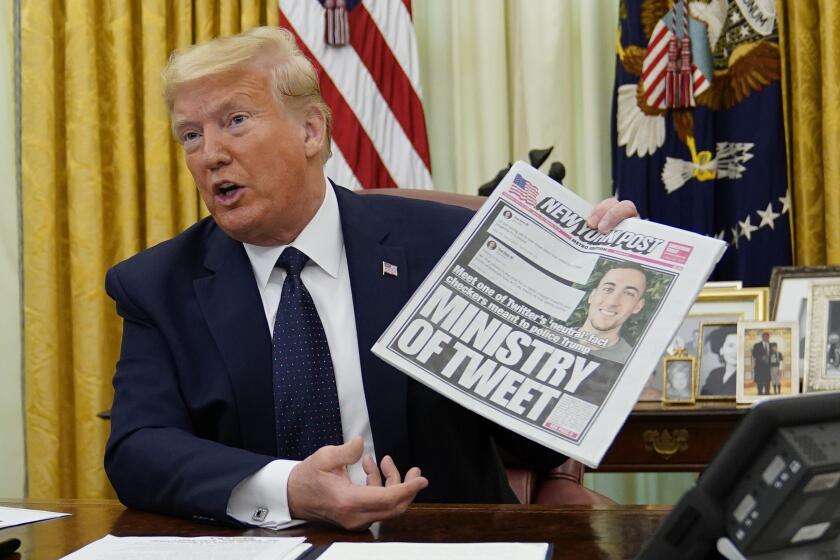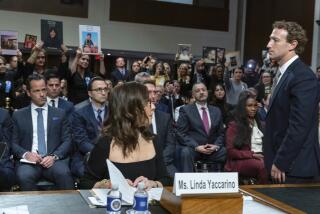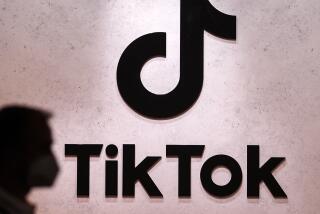Social media CEOs grilled about bias, misinformation and censorship

Twitter, Facebook and Google CEOs are facing a grilling by GOP senators on the premise that the tech giants show anti-conservative bias.
WASHINGTON — Days before an election marked by fears of civil war and stolen victory, the Senate heard testimony Wednesday morning on a rare subject where there exists something resembling bipartisan agreement: the need to rethink the law shielding internet platforms from liability for the content they host.
Three of the biggest names in digital media — Alphabet Chief Executive Sundar Pichai, Facebook Chief Executive Mark Zuckerberg and Twitter Chief Executive Jack Dorsey — spoke before the Senate Committee on Commerce, Science, and Transportation about Section 230 of the 1996 Telecommunications Act, in the latest indication of a political environment that’s become increasingly hostile to Big Tech.
Section 230 established that websites and service providers are not legally responsible for what their users post, while leaving the door open for them to moderate user content as long as they do so “in good faith.” It’s this question of moderation that’s prompted some of the most aggressive attacks on the law, which President Trump has moved to weaken and former Vice President Joe Biden once said “immediately should be revoked.”
Trump’s executive order targeting Twitter is based on a law called Section 230 — which may be the most important law for speech on the internet
In their opening statements, committee Chairman Sen. Roger Wicker (R-Miss.) and ranking member Sen. Maria Cantwell (D-Wash.) each took the tech giants to task — albeit for very different reasons.
“My concern is that these platforms have become powerful arbiters of what is true and what content users can access,” Wicker said. He invoked a “long trail of censorship and suppression of conservative voices on the internet,” drawing on long-running Republican claims that social media limit the spread of right-wing content.
Cantwell, meanwhile, highlighted concerns about the role of social media in the decline of local news and Russian election interference.
“There are actors who have been at this for a long time,” she said of the latter issue. “They wanted to destabilize Eastern Europe, and we became the second act when they tried to destabilize our democracy here by sowing disinformation.”
On the question of how much Section 230 should change, the tech CEOs were divided.
Dorsey set the tone by arguing that “removing Section 230 will remove speech from the internet” while acknowledging that the “good faith” component of the law means Twitter and its peers still need to earn their users’ trust.
Pichai labeled the internet “a powerful force for good” and an “equalizer,” while also citing a responsibility on the company’s part to protect users from harmful content — something Google does “without political bias,” he added.
“Our ability to provide access to a wide range of information is only possible because of existing legal frameworks, like Section 230,” Pichai said.
But Zuckerberg split from his peers, calling for the government to rethink the law even while noting that Section 230 protects Facebook from pressure to both overzealously remove and entirely ignore harmful content.
“Section 230 helped create the internet as we know it … but the internet has also evolved, and I think that Congress should update the law to make sure that it’s working as intended,” Zuckerberg said, echoing previous calls he’s made for more government regulation of the tech sector. “One important place to start would be making content moderation systems more transparent.”
Fervor over Section 230 has been particularly high in recent weeks thanks to steps taken by Facebook and Twitter to curb the spread of a New York Post story about alleged corruption involving Hunter Biden, the former vice president’s son, and Ukrainian natural gas company Burisma. Within hours of the story’s publication, Facebook moved to reduce its spread and Twitter blocked it from being shared at all.
Republican members of the committee returned to the platforms’ suppression of the Post story throughout the hearing. Wicker cited it in his opening statement, suggesting an “apparent double standard” in how the two platforms handled the New York Post story versus how they handled prior reporting about Trump’s leaked tax returns in the New York Times and the “Steele dossier,” which alleged conspiracy between Trump’s 2016 campaign team and Russian agents.
In response, Zuckerberg and Dorsey offered new insight into their companies’ decisions. Zuckerberg said an FBI alert had put Facebook on “heightened alert” for “hack-and-leak” operations, while Dorsey said the story had initially been restricted because Twitter believed it violated a policy on hacked materials. Twitter has since updated that policy, Dorsey added.
Republicans in the Senate Judiciary Committee recently authorized subpoenas that would have compelled Dorsey and Zuckerberg to testify in a different hearing specifically about their handling of the Post story. The Judiciary Committee later announced that the two will testify voluntarily on Nov. 17.
Other questions from Republican Commerce committee members called attention to the alleged liberal bias of tech company employees and inconsistencies in how Twitter moderates Trump’s posts versus those of other world leaders.
On the latter point, Sen. Cory Gardner (R-Colo.) asked Dorsey why tweets by Iran’s Ayatollah Ali Khamenei questioning the reality of the Holocaust were not flagged as misinformation, when posts by Trump have been.
Dorsey responded that Twitter does not have a generic policy against misinformation, but rather, against three categories of misinformation: manipulated media, public health and election integrity. Holocaust denial is “misleading information, but we don’t have a policy against that type of misleading information,” he said. (In fact, Twitter adopted a policy against Holocaust denial two weeks ago, following a similar move by Facebook.)
Democrats on the committee, meanwhile, focused their questions on cases where they say the tech platforms haven’t moderated user content rigorously enough. Democratic senators touched on such concerns as hate speech, election disinformation (both domestic and foreign in origin), COVID-19 conspiracy theories and the use of social media as a recruiting platform by extremists, including the suspected would-be kidnappers of Michigan Gov. Gretchen Whitmer.
“The issue is not that the companies before us today are taking too many posts down,” said Sen. Edward J. Markey (D-Mass). “The issue is that they’re leaving too many dangerous posts up. In fact, they’re amplifying harmful content so that it spreads like wildfire.”
Markey’s complaints echoed those of critics who have spent months urging the social media giants to more aggressively limit the spread of the right-wing QAnon conspiracy theory and disinformation about COVID-19 and the reliability of mail-in ballots.
Wednesday’s hearing followed a pattern that has become familiar since 2016 as legislators have called leaders of the big tech companies to Capitol Hill repeatedly, with representatives of the two parties seemingly holding their own parallel hearings.
In July, when Zuckerberg and Pichai spoke to the House antitrust subcommittee, both sides of the aisle were similarly critical of Big Tech, but Democrats focused on allegedly monopolistic business practices while Republicans dwelled on alleged anticonservative bias.
Under Trump, Republicans have increasingly warmed to the antitrust angle as well. Earlier this month, the Justice Department, joined by 11 states with Republican attorneys general, filed a lawsuit against Google over anticompetitive market behavior. The Federal Trade Commission is reportedly close to filing its own antitrust case.
While revisiting or tossing Section 230 is a cause that has adherents in both parties, the bipartisanship on display at Wednesday’s hearing had distinct limits. Multiple Democrats criticized the hearing as a partisan sham intended to provide last-minute support for Trump’s reelection campaign, with Sen. Brian Schatz (D-Hawaii) going so far as to refuse to ask any questions of the executives.
“What we are seeing today,” Schatz said, “is an attempt to bully the CEOs of private companies into carrying out a hit job on a presidential candidate.”








